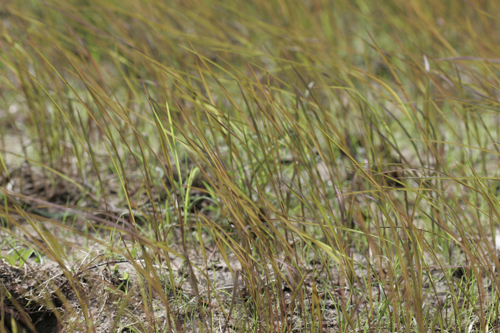| |
Saline resistant organic rice
Salt water in coastal rice fields is a problem that is certain to get worse as sea levels rise.
Sri Lanka has experienced an increase in temperatures and relatively low rainfall for an extended period over the last 20 years, leading to a decrease in ground water levels. At the same time, increased sea levels have also caused sea water intrusion into coastal lagoons and estuary systems, causing the destruction and slow change of existing habitats.
Practical Action's work has included farmer-led trials of traditional and modern rice varieties which are saline-tolerant, temperature-resistant and pest-resistant.
Indigenous rice
Forgotten types of indigenous rice can offer a home grown solution to the increasing soil salinity. There are around 2,000 traditional rice varieties in Sri Lanka. Many are very high in nutritional value and have medicinal properties, and most are resistant to extreme drought conditions, diseases and pests.
These varieties were traditionally grown using natural inputs such as organic manure, and no chemical fertilisers or pesticides were used. Farmers with Practical Action have worked on a number of trials on various rice varieties to see if they could withstand salinity.
For example, farmer S. Ranjith is now in his third year of growing traditional saline resistant varietie, folllowing extensive trials with other local farmers. "We were on the verge of abandoning our fields. The introduction of traditional rice has given a new lease of life to us and these fields," said Ranjith who is now a certified traditional rice grower and seed producer. What's more, the application of organic fertilizer has begun to ease the soil salinity problem as well.
Links:
Saline resistant rice
Practical Action
Other projects on amphibiliving.net by Practical Action:
Floating gardens
|
|
 Photograph: Practical Action/Anuruddha Lokuhapharachchi |
 Photograph: Practical Action/Anuruddha Lokuhapharachchi Photograph: Practical Action/Anuruddha Lokuhapharachchi
In Mathurankerny Kulam, Sri Lanka on land which due to the war has not been farmed for 3/4 years, the traditional irrigation infrastructure has been destroyed. The ground has become dryer and more saline. Farmers are cultivating an organic variety of rice known as Rathkada which thrives in such conditions.
|
 Photograph: Practical Action/Anuruddha Lokuhapharachchi
Photograph: Practical Action/Anuruddha Lokuhapharachchi Photograph: Practical Action/Anuruddha Lokuhapharachchi
Photograph: Practical Action/Anuruddha Lokuhapharachchi